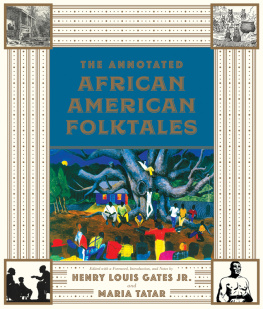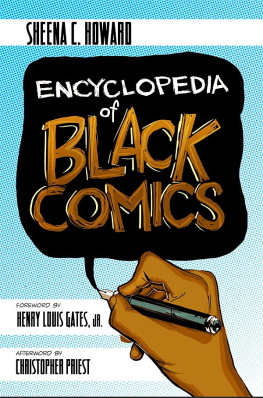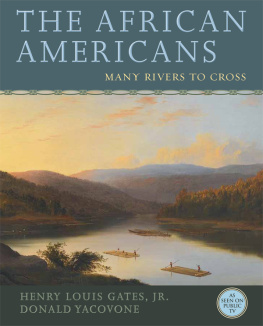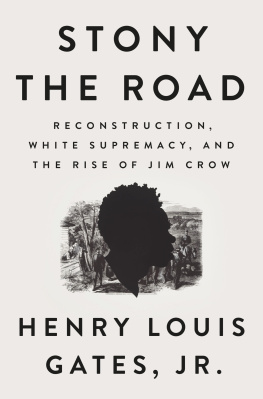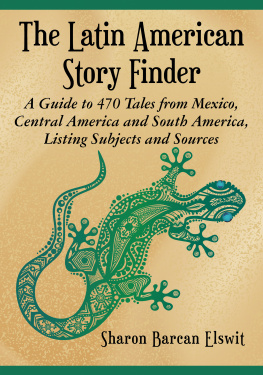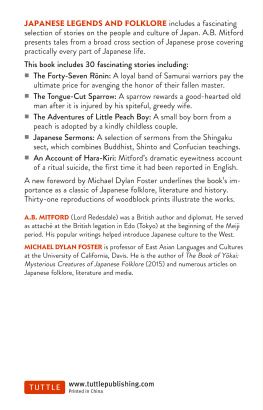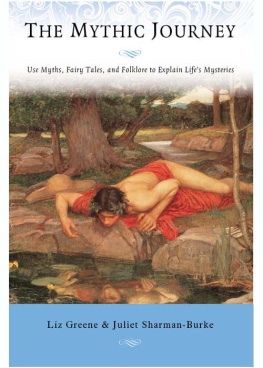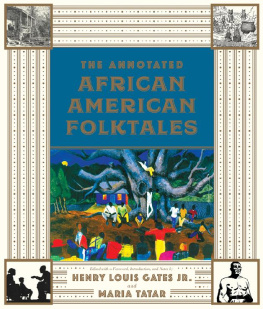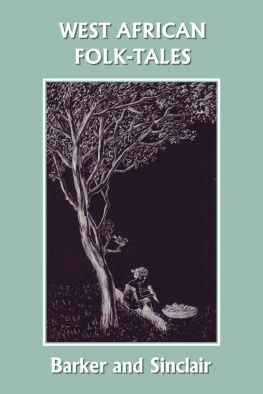

Adjusting type size may change line breaks. Landscape mode may help to preserve line breaks.
For all those before us who kept these stories alive by listening to the voices of others:
Talk got us here.

Henry Louis Gates Jr. dedicates this volume to Eleanor Margaret Gates-Hatley
Ldor vador!

Maria Tatar dedicates this volume to Lauren Blum, Daniel Schuker, Jason Blum, Giselle Barcia, and Roxy Blum
This interlinking of the New World and all countries and ages, by the golden net-work of oral tradition, may supply the moral of our collection.
WILLIAM WELLS NEWELL ,
Games and Songs of American Children

Mouse goes everywhere. She prowls through the houses of the rich, and she visits the poor as well. At night, with her bright little eyes, she watches the doing of secret things, and no treasure chamber is so safe but she can tunnel through and see what is hidden there.
In olden days she wove a story-child from everything she saw, and to each of these she gave a gown of a different colorwhite, red, blue, or black. The stories became her children and lived in her house and served her because she had no children of her own.
Nigerian folktale

CONTENTS

FOREWORD
The Politics of Negro Folklore
by Henry Louis Gates Jr.
The Negroes have a wonderfull Art of communicating Intelligence among themselves. It will run severall hundreds of Miles in a Week or Fortnight.
John Adamss Diary, September 24, 1775
The American Negroes are rising so rapidly from the condition of ignorance and poverty in which slavery left them, to a position among the cultivated and civilized people of the earth, that the time seems not far distant when they shall have cast off their past entirely, and stand an anomaly among civilized races, as a people having no distinct traditions, beliefs or ideas from which a history of their growth may be traced. If within the next few years care is not taken to collect and preserve all traditions and customs peculiar to the Negroes there will be little to reward the search of the future historian who would trace the history of the African continent through the years of slavery to the position which they will hold a few generations hence.
ALICE BACON , Editorial, Southern Workman , December 1893
The black man is readily assimilated to his surroundings and the original simple and distinct type is in danger of being lost or outgrown. To my mind, the worst possibility yet is that the so-called educated Negro, under the shadow of this over powering Anglo-Saxon civilization, may become ashamed of his own distinctive features and aspire only to be an imitator of that which can not but impress him as the climax of human greatness, and so all originality, all sincerity , all self- assertion would be lost to him. What he needs is the inspiration of knowing that his racial inheritance is of interest to others and that when they come to seek his homely songs and sayings and doings, it is not to scoff and sneer, but to study reverently, as an original type of the Creators handiwork.
ANNA JULIA COOPER , Letter to the Editor, Southern Workman , January 1894
I am speaking then, not with regards to the past, but the future, when I say that it is of consequence for the American Negro to retain the recollection of his African origin, and of his American servitude. For the sake of the honor of his race, he should have a clear picture of the mental condition out of which he has emerged: this picture is not now complete, nor will be made so without a record of song, tales, beliefs, which belongs to the stage of culture through which he has passed.
WILLIAM WELLS NEWELL , The Importance and Utility of the Collection of Negro Folk-Lore, Southern Workman , July 1894
The field of folklore in general is known to be a battle area, and the Negro front is one of the hottest sectors. One sharply contested point is the problem of the definition of the folk; another that of origins. Allies are known to have fallen out and skirmished behind the lines over such minor matters as identifying John Hardy with John Henry.
STERLING A. BROWN , Negro Folk Expression, Phylon , 1950
Surely a most interesting volume could be gathered of the traditions, proverbs, sayings, superstitions and folk-lore of the American Negro, and as you suggest, unless this is done immediatelyi.e. before the present generation of Negroes pass from the stage, the opportunity will be lost forever. Whatever is done, then, must be done quickly.
REVEREND WILLIAM V. TUNNELL , King Hall, Washington, D.C., Letter to the Editor, Southern Workman , December 1893
The Southern Workman was a monthly magazine founded in 1872 by Gen. Samuel Chapman Armstrong, Booker T. Washingtons mentor and inspiration, and the founder and first principal of Hampton. It would cease publication in 1939. Though they were delivered second on the program that evening, lets first examine the remarks of Anna Julia Cooper, the pioneering black feminist who had published her powerful manifesto A Voice from the South two years earlier, in 1892, and who in the Southern Workman was identified as a member of the Washington Negro Folk-Lore Society. Coopers argument was, perhaps, the first made by a black feminist intellectual for the importance of Negro folklore, and her remarks proved prescient in defining the terms of the debate about the nature and function of this body of oral lore and its relation to the social progress and political status of an emergent people just twenty-nine years up from slavery.
Cooper cleverly cast the heart of her argument for preserving Negro folklore in terms of originality:
Emancipation from the model is what is needed. Servile copying foredooms mediocrity: it cuts the nerve of soul expression. The American Negro cannot produce an original utterance until he realizes the sanctity of his homely inheritance. It is the simple, common, everyday things of man that God has cleansed. And it is the untaught, spontaneous lispings of the child heart that are fullest of poetry and mystery.... [Correggio] felt the quickening of his own self consciousness as he gazed on the marvelous canvasses of the masters. I too am a painter , he cried and the world has vindicated the assertion. Now it is just such a quickening as this that must come to the black man in America, to stimulate his original activities. The creative instinct must be aroused by a wholesome respect for the thoughts that lie nearest. And this to my mind is the vital importance for him of the study of his own folklore. His songs, superstitions, customs, tales, are the legacy left from the imagery of the past. These must catch and hold and work up into the pictures he paints....
Next page
